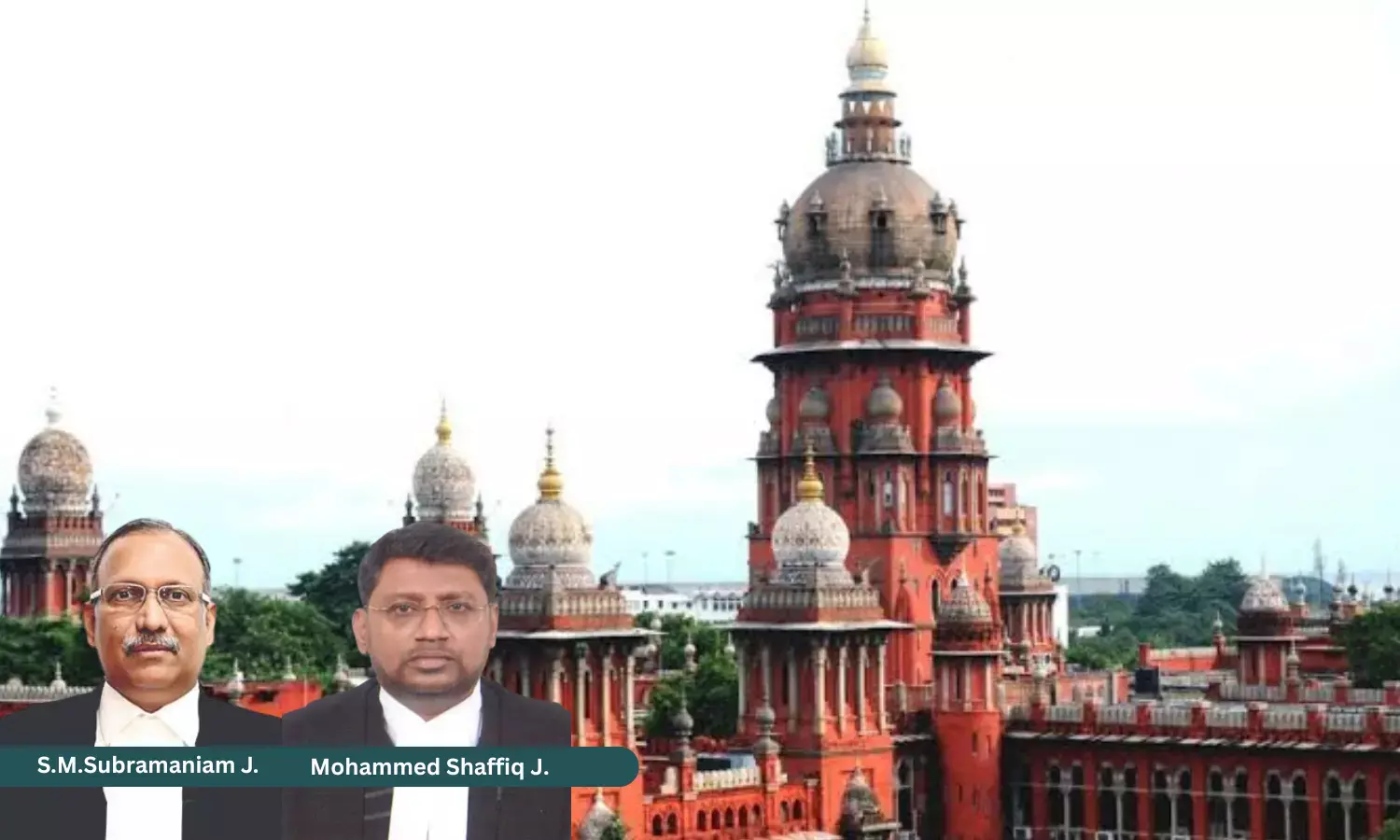No Fresh Cognizance Required For Supplementary Complaints Under PMLA: Madras High Court
The High Court held that once cognisance of an offence has been taken, any further supplementary prosecution complaint is deemed to form part of the main complaint and does not require cognisance to be taken afresh.

Justice S.M. Subramaniam, Justice Mohammed Shaffiq, Madras High Court
The Madras High Court has held that a supplementary prosecution complaint filed under the Prevention of Money Laundering Act, 2002 (PMLA) is not a fresh or independent complaint, and therefore, the question of taking cognisance for a second time does not arise.
The High Court emphasised that a supplementary complaint is “deemed to be part and parcel of the main complaint” and flows from the cognisance already taken.
The Court was hearing a criminal revision filed against the order issuing process on a second supplementary prosecution complaint, in which the petitioner was newly arrayed as an accused.
A Division Bench of Justice S.M. Subramaniam and Justice Mohammed Shaffiq, referring to the statutory framework and earlier decisions, while reiterating the principle that cognisance is taken of the offence and not the offender, further observed: “supplementary complaint is not a fresh or independent complaint but is deemed to be part and parcel of the main complaint in respect of which cognizance has already been taken. Taking multiple cognizance of the same offence would render the judicial process redundant and result in delay in the justice delivery process. Once cognizance of an offence is taken, any further supplementary prosecution complaint is considered as flowing from the main prosecution complaint for which the Court has already taken cognizance. So adding multiple layers of procedure to an already cognized complaint is a futile exercise”.
Advocate Shree Singh represented the petitioner. The Enforcement Directorate was represented by N. Ramesh, Special Public Prosecutor for ED cases.
Background
The Enforcement Directorate filed the main prosecution complaint under Section 44(1)(b) of the PMLA, alleging that Surana Industries Limited had engaged in a conspiracy to defraud public sector banks through the manipulation of accounts and diversion of loan proceeds. Cognisance of the main complaint was taken by the Special Court.
A first supplementary complaint was thereafter filed, adding more accused. Subsequently, a second supplementary complaint was filed, in which the petitioner was included for the first time. The Special Court issued a process on this supplementary complaint. The petitioner challenged that order, asserting that the Court could not act without granting a pre-cognisance hearing.
Court’s Observation
The Madras High Court examined the statutory framework under the PMLA and the BNSS, noting that Explanation (ii) to Section 44 expressly recognises supplementary complaints and stipulates that they form part of the main prosecution complaint.
The Bench reaffirmed the principle that cognisance is taken only once and only of the offence. It relied upon R.R. Chari v. State of Uttar Pradesh, Fakhruddin Ahmad v. State of Uttaranchal, and Prasad Shrikant Purohit v. State of Maharashtra, reiterating that the act of taking cognisance requires the application of the judicial mind to the offence disclosed, not to individual offenders.
The Court further clarified that the expression in the daily order suggesting “cognisance as against accused 28 to 42” was merely an error in expression. The order was to be understood as taking the second supplementary complaint on file and adding it to the already-cognised proceedings. The Bench observed that such an error is a “curable error” and does not vitiate the proceedings.
The Court also dealt with the petitioner’s contention regarding a pre-cognisance hearing under the proviso to Section 223(1) of the BNSS. The Bench held that the requirement applies only when cognisance is taken for the first time. Since cognisance had already been taken of the main complaint, the proviso had no application.
The Court distinguished the judgment in Kushal Kumar Agarwal v. Enforcement Directorate, relied upon by the petitioner, noting that the Supreme Court was dealing with a fresh complaint in that case.
On the issue of whether the second supplementary complaint was based on “stale material,” the Bench considered the submissions of both sides. The petitioners relied on Mariam Fasihuddin v. State of Karnataka, asserting that no fresh material was collected.
The Enforcement Directorate, however, demonstrated that the second supplementary complaint was based on the complaint filed by the Serious Fraud Investigation Office (SFIO), which constituted fresh material and a new scheduled offence forming the basis of further investigation. The Bench accepted this submission and held that the SFIO complaint could not be described as stale material.
Accordingly, the Court held that the second supplementary complaint was maintainable, that the order issuing process disclosed proper application of mind, and that no procedural illegality had occurred.
Conclusion
The High Court dismissed the criminal revision. The Court held that the petitioner was not entitled to a pre-cognisance hearing and that the second supplementary complaint was founded on fresh material derived from the SFIO complaint.
Cause Title: Rahul Surana v. Directorate of Enforcement (Neutral Citation: 2025:MHC:2623)
Appearances
Petitioner: Advocates Shree Singh and Mayank Pandey
Respondent: N. Ramesh, Special Public Prosecutor for ED Cases


